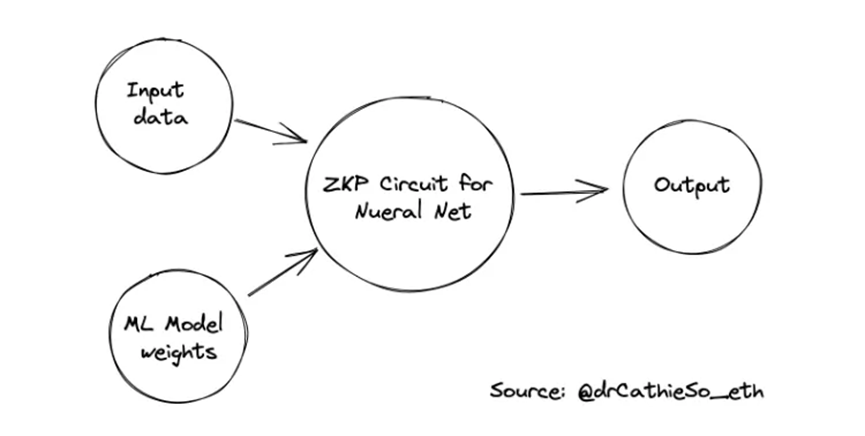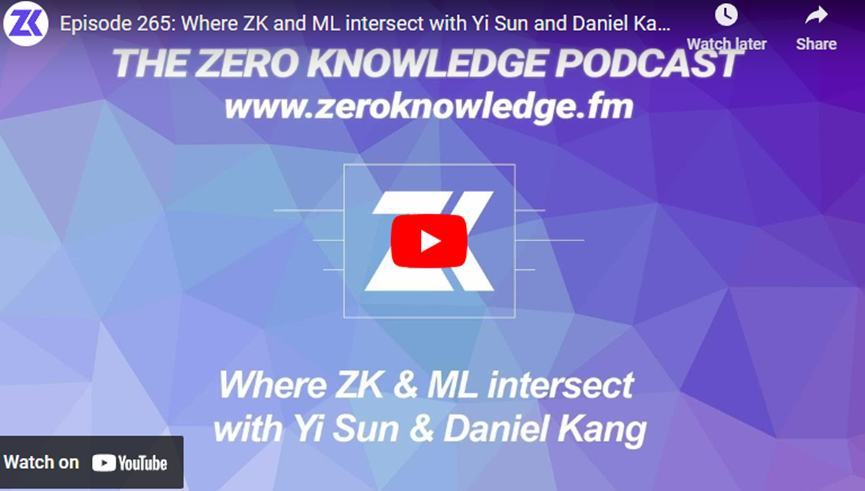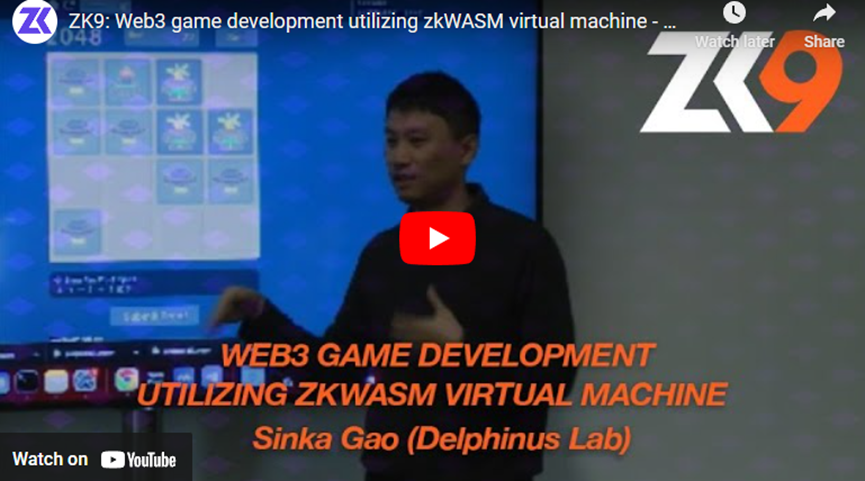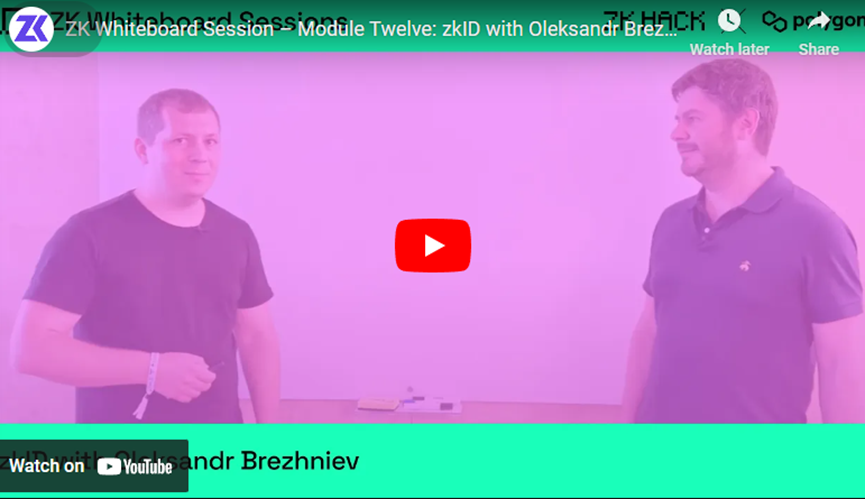Original Title: "Emerging ZK Use Cases"
Original Author: zkvalidator
Translated by: Kate
In this article, we will explore emerging use cases for ZK.
Introduction
Over the past few months, we have witnessed a lot of hype surrounding zero-knowledge use cases, including zkevm, zkBridges, and more. However, in such a fast-paced environment, new use cases are emerging, in which Zero-Knowledge Proofs (ZKP) play a crucial role. This article aims to explore areas where ZKP is gaining more attention in the personal sphere.
ZKML: Zero-Knowledge Machine Learning

This diagram illustrates how zkML works
ZKML (Zero-Knowledge Machine Learning) is an emerging technology with tremendous potential in various applications that has yet to be fully developed. From computational integrity and privacy preservation to transparency in machine learning as a service and decentralized inference or training, ZKML opens up new doors for innovation. Here are some potential use cases for ZKML:
ZKML Verifiability: ZKML leverages proofs of correctness, such as SNARKs and STARKs, to ensure accurate execution of computations, particularly in machine learning. By using these proofs, it is possible to verify the inference of machine learning models and confirm the source of the output given a certain input. This functionality enables the deployment of machine learning models off-chain while conveniently verifying ZK proofs on-chain.

https://youtu.be/odaUPMNqJs 8
ZKML's Privacy Protection: Privacy is a crucial issue in machine learning, and ZKML provides a solution. It can prove the accuracy of the model on test data without revealing the weights used, ensuring data privacy. Additionally, ZKML facilitates privacy-preserving inference, allowing sensitive medical diagnoses, such as cancer detection results, to be shared with patients without disclosing their data to third parties.
Enhancing Transparency for Machine Learning-as-a-Service (MLaaS): ZKML plays a vital role in improving transparency for Machine Learning-as-a-Service. By providing evidence of effectiveness associated with machine learning model APIs, users can verify the authenticity of the models they are using. This addresses issues associated with traditional APIs (often perceived as black boxes) and increases trust in the provided models.
Decentralized Inference and Training: ZKML can perform machine learning tasks in a decentralized manner. The model can involve the public in inference or training processes through compression using zero-knowledge proofs. This opens up new avenues for collaboration and distributed machine learning.
ZKML Proofs: Proofs are an important aspect of ZKML, allowing verifiable proofs to be merged from trusted external parties. By using zero-knowledge proofs to verify digital signatures from reliable sources, ZKML ensures the authenticity and origin of the proven information. This enables the verification and use of trusted references in various applications.
The Application of ZK in Gaming

https://youtu.be/dLZbfTWLGNI
Zero Knowledge Proofs (ZKP) offer many advantages for game architecture and gaming experience. By integrating ZKP, game developers can benefit from cost reduction, enhanced privacy protection, effective anti-cheating measures, and improved scalability.
In terms of game architecture, ZKP has a significant impact on online multiplayer games by minimizing sensitive data stored on centralized servers, thereby reducing the cost of maintaining client-server architectures. Additionally, ZKP strengthens the privacy and security of peer-to-peer (P2P) game systems, eliminating the need for expensive servers while ensuring the authenticity of in-game events and preventing cheating.
ZKP also addresses scalability challenges in client-server architectures by reducing server overhead and enabling verifiable proof of game operations in P2P multiplayer games. This expands the number of concurrent players supported, leading to a more enjoyable gaming experience and attracting a wider player audience.
As for the gameplay, ZKP provides solutions for various types of games. In first-person shooter (FPS) games, ZKP can verify players' skill levels without revealing sensitive information, thereby improving matchmaking accuracy. In massive multiplayer online role-playing games (MMORPG), ZKP can secure ownership and exchange of virtual assets, creating a unified economy across different games. ZKP also has applications in gambling and casino games, providing verifiable random results and protecting players' privacy. Additionally, ZKP can ensure players' progress and high scores in puzzle and strategy games while maintaining the confidentiality of sensitive information.
Adopting ZKP in the gaming industry can enhance the gaming experience, increase player retention, and generate higher revenue. As the scope of ZKP continues to expand, dedicated hardware may become crucial to meet the growing computational demands.
ZK ID - Decentralized ID

https://youtu.be/5 TJ 3 BZEc 1 Ro
In today's network environment, establishing digital trust and secure identity verification is crucial. The emergence of zero-knowledge proofs (ZKP) has fundamentally transformed this field by providing higher privacy and security. Here, we will explore the properties and advantages of zero-knowledge proofs and their potential to redefine digital identity verification.
Enhanced privacy protection: Zero-knowledge proofs excel in protecting sensitive information. Users can verify their identity or credentials without revealing specific details like social security numbers or addresses. ZKP establishes a secure framework that allows trustless interactions while maintaining confidentiality.
Secure and verifiable interactions: Zero-knowledge proofs enable users to participate in smart contracts and verify information on the blockchain while concealing their private data. Off-chain credentials like passports or education degrees can generate zero-knowledge proofs. These proofs can then be used for trustless verification on the blockchain, ensuring data integrity while preserving privacy.
Recently, Polygon launched Polygon ID, a zero-knowledge decentralized identity solution. Leveraging the power of zero-knowledge proofs, Polygon ID allows users to verify their identities without revealing sensitive information. It provides a comprehensive toolkit including a verifier SDK, issuer nodes, wallet SDK, and wallet applications, enabling developers to seamlessly integrate decentralized identity solutions into their applications.
Conclusion
In summary, the diversity of ZK's positive impact areas indicates the potential for widespread adoption in the blockchain industry. In fact, most of these applications - zkML, ZK games, ZK ID - are still in their early stages, with some largely remaining in the theoretical realm. Nevertheless, we see more activity and products coming from the zkML, ZK games, and ZK ID domains only a matter of time. With the maturity of these domains, we anticipate a vibrant ZK-based application ecosystem that will redefine our concepts of privacy, security, and verifiability.